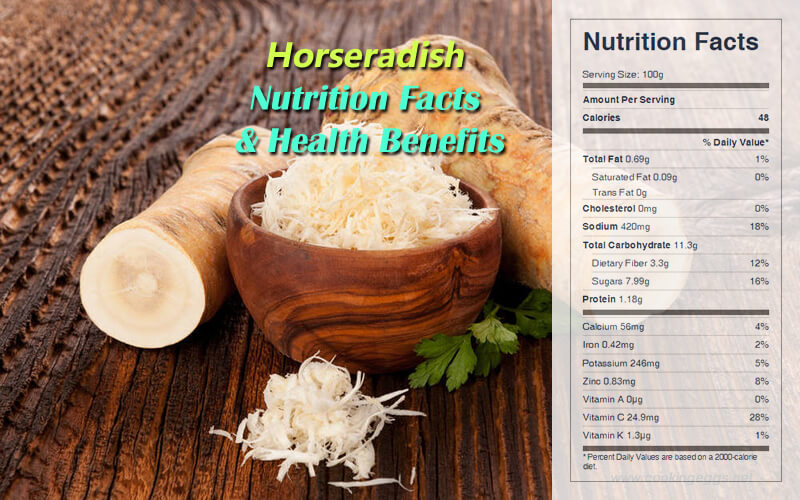Horseradish Nutrition Facts & Health Benefits
Horseradish is a perennial plant of the family Brassicaceae. It is a root vegetable, cultivated and used worldwide as a spice and as a condiment. Horseradish was originally a medicinal herb, but most of us now only know it as a jarred condiment used to flavor roast beef.

The nutritional value of horseradish
In a 100-gram amount, prepared horseradish provides 48 calories and has a high content of vitamin C with moderate content of sodium, folate, and dietary fiber, while other essential nutrients are negligible in content.
One tablespoon of prepared horseradish provides 6 calories, 1.4 g carbohydrate, 0.2 g protein, 0 g fat, 0.5 g dietary fiber, 44 mg potassium, 14 mg sodium, 5 mg phosphorus, and 9 mg calcium.
Horseradish Nutrition Facts Label
Health Benefits of Horseradish
Horseradish root and leaves were used as a traditional medicine during the Middle Ages. Native Americans used it to stimulate the glands, stave off scurvy, and as a diaphoretic treatment for the common cold.
Horseradish is high in vitamin C and aids in the digestion of fatty foods. Vitamin C helps remove harmful free radicals from the body and may help protect it from cancer, inflammation, and infections.
The mustard oils are released from horseradish when it is crushed. Mustard oil glycosides and coumarins are one of the richest plant sources of peroxide enzymes. One of its main medicinal uses is for the treatment of nasal congestion and sinusitis because of its decongestant effect.
grated Use horseradish root in hot water to ease flu symptoms or urinary tract infections. as a nasal decongestant.as a snuff a poultice for stiff muscles and rheumatic conditions.
Horseradish root sliced and infused in milk fades age spots and improves skin clarity.
Like other Brassica plants, which also include mustard, wasabi, broccoli, cabbage, and radish, horseradish contains significant amounts of glucosinolates—compounds that have been shown to increase the liver’s ability to detoxify carcinogens and that may suppress the growth of cancerous tumors. But horseradish is especially rich in these compounds, providing ten times as many of them as broccoli does.
Horseradish also aids digestion and contains compounds known to fight pathogens in food, such as Listeria, E. coli, and Staphylococcus aureus.
Health Risk
On exposure to air, the root changes colour and loses its volatile strength. Too much caffeine becomes emetic. Avoid using it for long periods when pregnant or suffering from kidney problems.
Some skins may become vesicant; large internal doses cause gastro-intestinal mucosal inflammation.
Skin contact with fresh horseradish can cause irritation, blistering or allergic reactions.